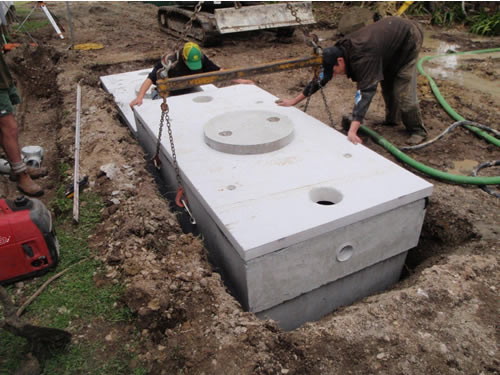
23
When looking for a septic tank, one of the most important things to do is decide what type you want to have installed. Most modern septic tanks are either plastic or concrete. Depending on the needs of your home or business and its environment, each type of septic tank has its advantages and disadvantages. Follow this guide and consult with your septic company on which septic tank is best suitable for you.
The price of a septic tank is a major concern for many homeowners. Plastic septic tanks are a good option if you want something affordable. Concrete tanks are more expensive to purchase than plastic tanks. If you buy a concrete tank, you can expect to spend at least a few hundred dollars more on average. If you choose a plastic tank, you'll probably save a little money on repairs because they're easier to fix. A concrete tank will continue to cost more than a plastic tank after its lifespan has expired. When they stop functioning, the removal and disposal of concrete tanks can be quite expensive.
Plastic may be a better option if you want a straightforward installation of your septic tank. Concrete tanks typically require more expertise and take longer to install due to their intricate design and heavier weight. Plastic tanks may be easier for homeowners to install because concrete tank installation can be a little disruptive. Also, think about the difficulties of getting the tank to your property. Because concrete tanks are so heavy and bulky, it takes specialized equipment to move them. It may be significantly simpler to transport a plastic tank to your residence if you live in a remote area with challenging roads.
A concrete septic tank lasts much longer than a plastic septic tank does. A plastic septic tank typically lasts around 30 years, whereas a concrete tank can last up to 40 years. Plastic is more susceptible to environmental changes, which contributes to its shorter lifespan. A plastic tank can break due to soil vibrations or growing tree roots, whereas a concrete tank is not affected. As a result, plastic tanks frequently require more maintenance than concrete tanks. Concrete tanks are also stronger, so they are less likely to break if heavy machinery rolls over them.
Regardless of which septic tank you have, maintenance is important if you want your septic tank to have a longer lifespan. This includes having regular septic tank pumping and septic inspection. Septic tank pumping should be done every 3-5 years or as frequently as needed.
The advantages and disadvantages of concrete tanks and plastic tanks are roughly equal. That may or may not assist you in making a decision, but you can always seek guidance from a reliable septic company like Charlotte Septic Pros. Plastic is preferred by the majority due to its lower cost, simpler installation, and simpler maintenance, but this may not always be the case. Concrete might be a better choice if money isn't a big issue or if you're installing in a place with a lot of environmental concerns. Each household has its own needs, so select what’s suitable for you.

22
Can Bacteria Additives Eliminate the Need for Pumping? If you own a home with a septic system, you’ve probably seen…
Read more
12
A single slow drain in your home can feel like a minor inconvenience. Maybe the sink takes a little longer…
Read more
05
Are Slow Drains a Septic Issue or Just a Clog? Slow drains are one of those household problems that start…
Read more
02
What Septic Service Techs See That Homeowners Miss Most homeowners only think about their septic system when something goes wrong.…
Read more
21
Simple Habits That Protect Your Septic System A well-functioning septic system does its job quietly, but the moment something goes…
Read more
14
Pump Now or Pay Later: The Real Cost of Skipping Maintenance A properly functioning septic system is easy to forget…
Read more
11
Why Your Septic System Always Acts Up at the Worst Time Homeowners often feel that septic problems strike at the…
Read more
04
Early Warning Signs Your Septic Tank Needs Pumping For homeowners who rely on a septic system, routine maintenance is not…
Read more
29
Why Does My Septic System Smell Fine One Day and Terrible the Next? If you own a home with a…
Read more
19
Is Your Septic System Overdue? Simple Home Checks You Can Do Today For many homeowners, the septic system is a…
Read more